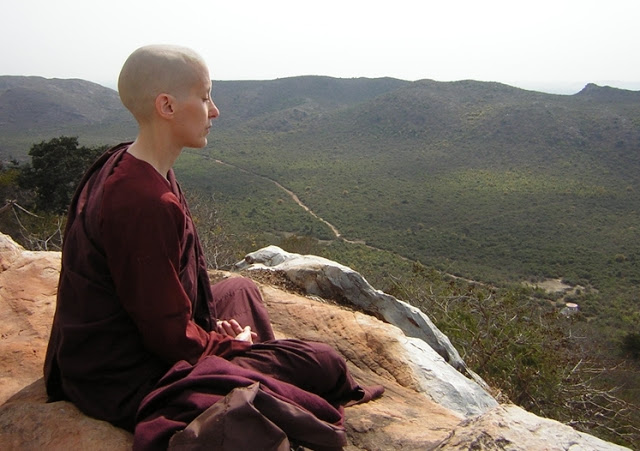Buddhist Women on a Path of Spiritual Awakening
Truly Ascend
 I have walked and lived in mountain ranges the world over – the Himalayas, the Andes, the Alps, the Picos de Europa, mountains in the Azores, South Asia, and North America. But not until I stayed in a tall building for a few months did I notice a visceral discomfort with heights.
I have walked and lived in mountain ranges the world over – the Himalayas, the Andes, the Alps, the Picos de Europa, mountains in the Azores, South Asia, and North America. But not until I stayed in a tall building for a few months did I notice a visceral discomfort with heights.
Then how was I able to roam those steep summits enjoying the view? I was aware of my phobia but I learned to conceal it well. We do this as human beings – not wanting to display our weaknesses. And we find ways of coping. When I needed to ground myself. I would keep my eyes on my feet or straight ahead on the path; or direct my gaze to the scene around me or to the horizon so that I could avoid the sight of sheer cliff faces or dizzying vistas.
Unwittingly, I relied on a practice that is also consonant with my monastic training and meditation – focus on the present moment, being with what I am doing rather than thinking about the past or the future. Looking around can distract the mind, consciously or not, from troubling thoughts or feelings: a painful memory, the face of someone threatening, or a loved one whose loss still haunts.
But eventually, being distracted or turning away from undercurrents that are fraught or disturbing can be detrimental and no longer serve our well-being. We may feel free to roam and do as we wish while tramping through the wilderness but on the spiritual path I have to descend to face what I fear – to see life exactly as it is from where I stand.
More vital to wisdom and understanding than being cushioned by exhilarating panoramas or placated by moments of calm is an ability to see Truth and live it. To grow in stature and be able to accept what is real – no matter the terrain of feelings we have to traverse – tortuous or peaceful, rocky or smooth: this is our life’s work.
Though I have trekked over lofty passes, fear has been the most punishing mountain to scale – especially on my own as an alms mendicant. For years, to survive in a western hamlet, dependent on a scattering of locals for my daily meal, I was forced to adapt. Too frightened to mention when food I received caused digestive disorder, I compromised my health to preserve the status quo – and not jeopardize my food source. Taking my lead, why wouldn’t my supporters, too, believe all was well?
Unable to look, I had chosen to suppress, deny, and blind myself to what had been brewing. My view of what it means to be an alms mendicant nun was fraught with idealism: want nothing and be content with and grateful for all that was given to me. So I clung to this flawed dynamic of striving for perfection without honouring my limits.
Only by letting that go could I free myself to enter authentic relationship with my supporters. They began to regard me as a person with legitimate needs, and in doing so, honour their wish to look after me properly. And being more honest about my needs, I could take better care of myself while respecting their goodwill.
Ironically, I had fallen into this predicament by flexing the old muscle that had helped me cope so well with heights. As long as I could ignore the altitude, I would not have to feel what I was feeling – in this case, hunger and distress. But this deception, moulded by stifling compassion for myself, had only made me ill. It was a foolish and unsustainable sacrifice. And in time, I would be brought down to earth with a bump – literally.
During a solitary retreat, I was attempting to water a plant on a high shelf. To reach it, I would have to climb on a chair. Without properly judging the stability of the chair or my own strength, barely poised as I stood on it, water jug in hand, the chair collapsed. One should never stand on a folding chair – but my hubris said: I can do this! Everything came crashing down, water, jug, plant, and nun – knocked unconscious and one leg maimed.
When help arrived, I refused to see a doctor so as not to inconvenience anyone. True to form, my mantra of ‘good enough’ rolled off my tongue: “I’m fine. Everything is okay.” But I had already managed to undermine myself three times: reaching beyond my capacity – to my own detriment, discounting the harmful result, and even after it dawned on me that I was indeed injured, carrying on as if it was just a minor discomfort.
That deformity is a perennial reminder of the lesson I learnt. The heights we aspire to are not to be measured in physical parameters nor in pretense and performance, but in the dimensions of coming down to earth and being true, exactly as we are. It is not enough only to open our eyes, we must also see clearly. Climbing ill-equipped, too steep, too high, impatient, unaware or blind to our limits, we can fall hard. Instead, bowing low and knowing the true measure of our strength, we truly ascend.
© Ayyā Medhānandī 2023
